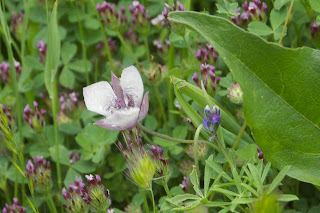A recent trip to the Siskiyou Mountains of Southern Oregon was
a great reminder of the reasons we grow native plants and create naturalistic
gardens in which to showcase them. Viewing plants in nature, whether on rocky
slopes, in meadows, woodlands or in alpine settings, is the perfect inspiration
for growing them at home. The Siskiyous are a botanically rich and diverse region and I was able to see plants growing in a wide range of native habitats.
When traveling in the Siskiyous, you learn to
expect the unexpected. Our namesake
plant, wild ginger, is generally a woodland plant. Here, Asarum marmoratum also grows on open rocky talus slopes with its
roots buried deep in the cool moist soils below.
Rock outcroppings become hanging gardens for Sedum spathulifolium and other native Sedum species.
Some attractive plants thrive along the roadways and we viewed
many Penstemon species, masses of Iris innominata and small perennials
like Phlox adsurgens.
Water is a limited resource in Western mountains and plants
develop strategies for coping with dry summers.
Geophytes such as Calochortus,
Triteleia and Lilium flower
in moist early season soils and go completely dormant as soils dry.
Other plants such as Aquilegia
formosa and Heuchera micrantha grow
near permanently moist areas in and around seeps, springs and streams.
I was particularly excited to spot the illusive Lilium bolanderi during this trip.
One of the most unique habitats in this region is the
serpentine bogs where the insectivorous Cobra Lily
Darlingtonia
californica grows in profusion along with
other serpentine tolerant plants such as the
Epipactus grandiflora and
Lilium
pardalinum ssp vollmeri.
Viewing these unique plants was one of the highlights of my trip and I am already making plans to build a new bog garden at the nursery!













































